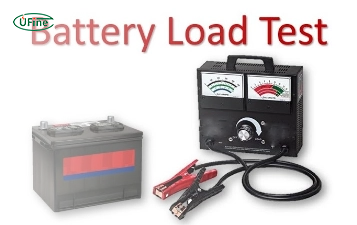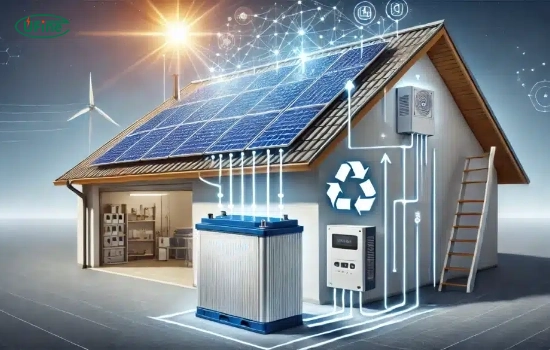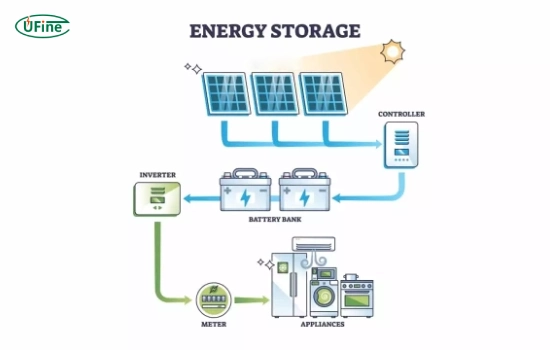
- Part 1. What is domestic battery storage?
- Part 2. Why is domestic battery storage important?
- Part 3. Types of domestic battery storage systems
- Part 4. How does domestic battery storage work?
- Part 5. Benefits of domestic battery storage
- Part 6. How to choose the right battery storage system?
- Part 7. Installation process of domestic battery storage
- Part 8. Maintenance of battery storage systems
- Part 9. Common misconceptions about domestic battery storage
- Part 10. FAQs
In today’s world, where energy efficiency and sustainability are paramount, domestic battery storage has become a vital solution for homeowners. This guide explores everything you need to know about domestic battery storage, including its benefits, types, installation processes, and much more, all in an accessible manner for beginners.
Part 1. What is domestic battery storage?
Domestic battery storage refers to systems that store energy for later use in residential settings. These systems typically charge during off-peak hours or when renewable energy sources, such as solar panels, generate excess electricity. You can use the stored energy during peak demand or when renewable sources aren’t producing power.
Think of domestic battery storage as a large rechargeable battery that you can use to power your home when you need it most.
Part 2. Why is domestic battery storage important?
The significance of domestic battery storage lies in its ability to:
- Enhance energy independence: Homeowners can rely less on the grid and reduce their electricity bills.
- Support renewable energy: Battery systems complement solar panels by storing excess energy for later use, increasing the efficiency of renewable installations.
- Provide backup power: In case of power outages, battery storage can supply electricity to essential appliances, ensuring continuity of service.
Homeowners can save money and contribute to a more sustainable energy future by investing in domestic battery storage.
Part 3. Types of domestic battery storage systems
There are several types of battery storage systems available for residential use. Understanding these types can help you make an informed decision:
- Lithium-ion batteries are the most common type due to their high energy density, efficiency, and longer lifespan. They are lightweight and can store significant energy in a compact size.
- Lead-acid batteries: These batteries have been used for decades. They are more traditional and generally cheaper. However, they have a shorter lifespan and lower efficiency compared to lithium-ion options. They are also often heavier and require more maintenance.
- Saltwater batteries: An emerging technology that is environmentally friendly and safe. While they are still in the early stages of commercialization, they offer a promising alternative to traditional battery systems.
Choosing the correct type of battery is crucial, as it affects your system’s efficiency, lifespan, and overall performance.
Part 4. How does domestic battery storage work?
Domestic battery storage systems work through a simple process:
- Charging: The battery charges during periods of low electricity demand or when solar panels produce excess energy. For example, if you have solar panels, they can charge the battery during sunny days.
- Storing: The energy is stored in the battery until it is needed. This allows homeowners to save energy for later use, similar to how you might save food in a refrigerator.
- Discharging: When demand increases or during power outages, the stored energy is released to power the home. This means you can use the stored energy during peak hours when electricity costs are higher.
This process ensures that homeowners can utilize their energy more efficiently and reduce reliance on the grid.
Part 5. Benefits of domestic battery storage
Investing in a domestic battery storage system offers numerous advantages:
- Cost savings: Homeowners can significantly reduce their electricity bills using stored energy during peak hours. This is especially beneficial in regions with time-of-use pricing.
- Environmental impact: Utilizing renewable energy sources reduces reliance on fossil fuels, leading to lower carbon emissions. For instance, you can minimize your carbon footprint by storing solar energy.
- Increased property value: Homes with battery storage systems can attract buyers looking for energy-efficient solutions. This can be a significant selling point in the real estate market.
- Energy resilience: With a battery storage system, you can maintain power during outages, providing peace of mind and security.
Part 6. How to choose the right battery storage system?
Selecting the right battery storage system involves considering several factors:
- Capacity: Your household’s consumption determines how much energy you need to store. We typically measure this in kilowatt-hours (kWh). A larger capacity allows for more energy storage but may also increase costs.
- Type of battery: Based on your budget and preferences, choose between lithium-ion, lead-acid, or saltwater batteries. Lithium-ion batteries are generally more efficient and have a longer lifespan but are more expensive.
- Compatibility with existing systems: Ensure the battery system integrates seamlessly with your solar panels or other energy sources. Some batteries are designed specifically for specific solar systems, so checking compatibility is essential.
- Warranty and lifespan: Look for a battery with a good warranty and a lifespan that meets your needs. Most lithium-ion batteries last between 10 to 15 years, while lead-acid batteries may only last 5 to 10 years.
Part 7. Installation process of domestic battery storage
The installation of a domestic battery storage system typically involves:
- Site assessment: A professional will evaluate your home’s energy needs and existing systems. This assessment determines the best battery size and type for your household.
- Choosing the right location: Install the battery in a safe, dry, and accessible area. Many homeowners choose a garage or basement for installation.
- Installation: A certified technician will install the battery, connecting it to your home’s electrical system and any renewable energy sources. This step is crucial for ensuring the system operates safely and efficiently.
- Testing: The system will be tested after installation to ensure it operates correctly. This includes checking the connections and providing the battery charges and discharges as expected.
Part 8. Maintenance of battery storage systems
Proper maintenance is crucial for the longevity and efficiency of battery storage systems:
- Regular checks: Inspect the battery and connections periodically for any signs of wear or damage. Look for corrosion or loose connections, which can affect performance.
- Software updates: Keep the system’s software up-to-date to ensure optimal performance. Many modern systems have apps that allow you to monitor performance and receive updates.
- Professional servicing: Schedule regular maintenance with a qualified technician to address any issues. This can help prevent more significant problems and extend the life of your battery system.
Part 9. Common misconceptions about domestic battery storage
Several myths surround domestic battery storage systems:
- They are too expensive: While the initial investment can be high, long-term savings often outweigh the costs. Many homeowners find that their energy bills decrease significantly after installation.
- They require a lot of maintenance: Most modern systems require only occasional checks and are designed to be low-maintenance. This makes them a convenient option for busy homeowners.
- They are unreliable: With technological advancements, battery systems are becoming increasingly reliable and efficient. Many systems can provide power for several hours during outages.
Part 10. FAQs
-
What is the lifespan of a domestic battery storage system?
The lifespan of a domestic battery storage system varies by type. Generally, it ranges from 5 to 15 years, depending on the battery technology used. -
Can I install a battery storage system without solar panels?
Yes, battery storage systems can be installed independently of solar panels, allowing you to store energy from the grid during off-peak hours for later use. -
How much energy can a domestic battery store?
The storage capacity varies by system, with most residential batteries storing between 5 kWh and 15 kWh of energy, which can power essential appliances during peak demand. -
Are there any government incentives for installing battery storage?
Many governments offer incentives, tax credits, or rebates for homeowners who install battery storage systems, particularly when paired with renewable energy sources like solar panels. -
Is it safe to install a battery storage system at home?
Yes, when installed by a qualified professional, battery storage systems are safe and comply with all relevant safety standards, ensuring peace of mind for homeowners.
Related Tags:
More Articles

Battery Load Test: A Comprehensive Guide
Step-by-step battery load test guide for car, solar & industrial use. Learn how to load test a battery, interpret voltage charts, and avoid common mistakes.
The Comprehensive Guide to Battery Balancing and Battery Balancer
Discover how battery balancers improve lithium battery performance, lifespan, and safety. Learn types, functions, and tips to choose the right balancer.
What Is the Best Voltage for a Chainsaw Battery?
Compare 12V-80V chainsaw batteries for light pruning, medium firewood, and professional cutting. See best battery chainsaw with runtime charts and safety tips.
Lithium VS. Alkaline Batteries: A Comprehensive Comparison
Lithium batteries last 3–7× longer than alkaline and perform better in cold weather. Compare lifespan, cost, safety, and best uses to choose the right battery.
Comparing Lithium-Sulfur and Lithium-Ion Batteries: Which is Right for You?
Compare lithium-sulfur (Li-S) and lithium-ion batteries on energy, lifespan, cost, safety, and applications. Best choice for drones, EVs, and electronics.




